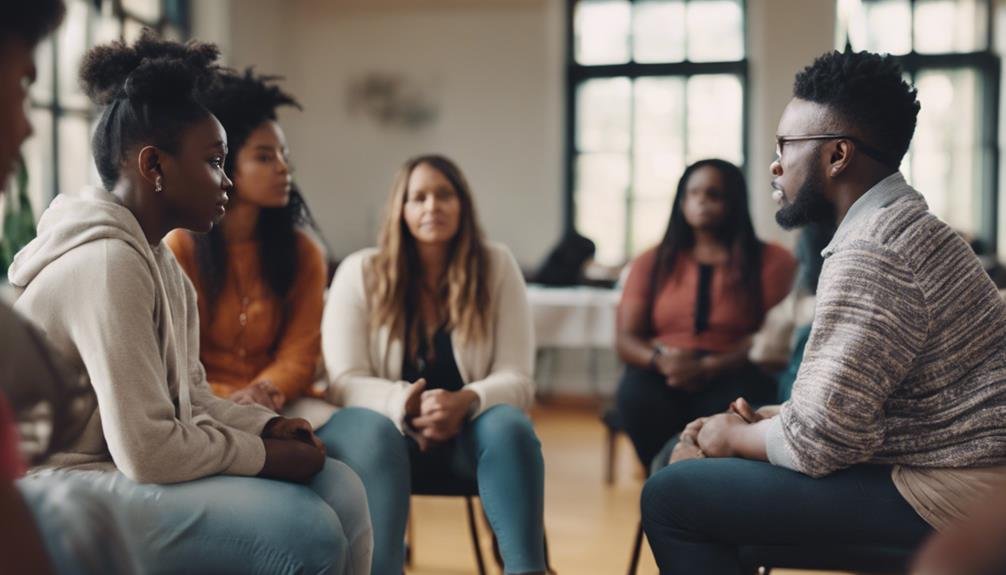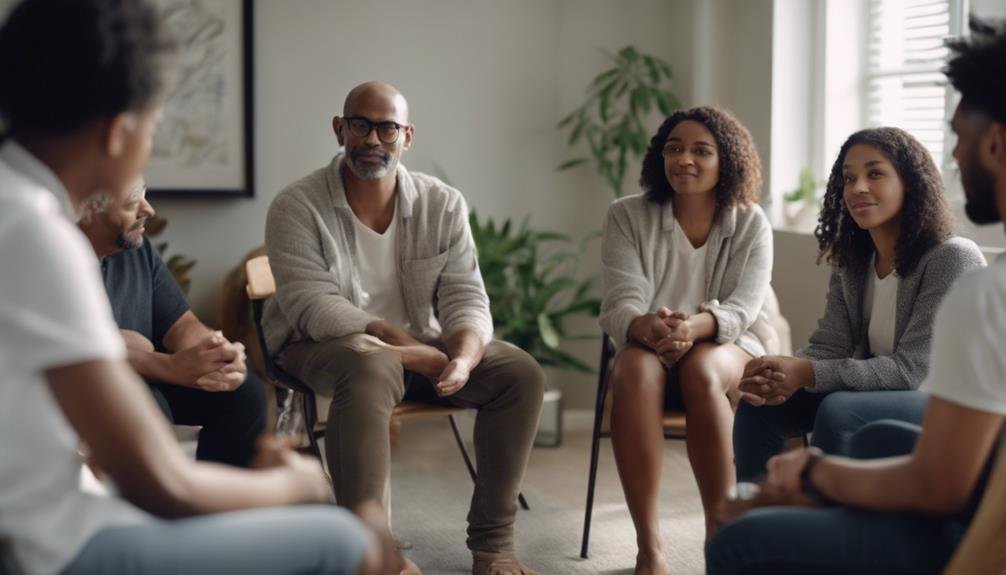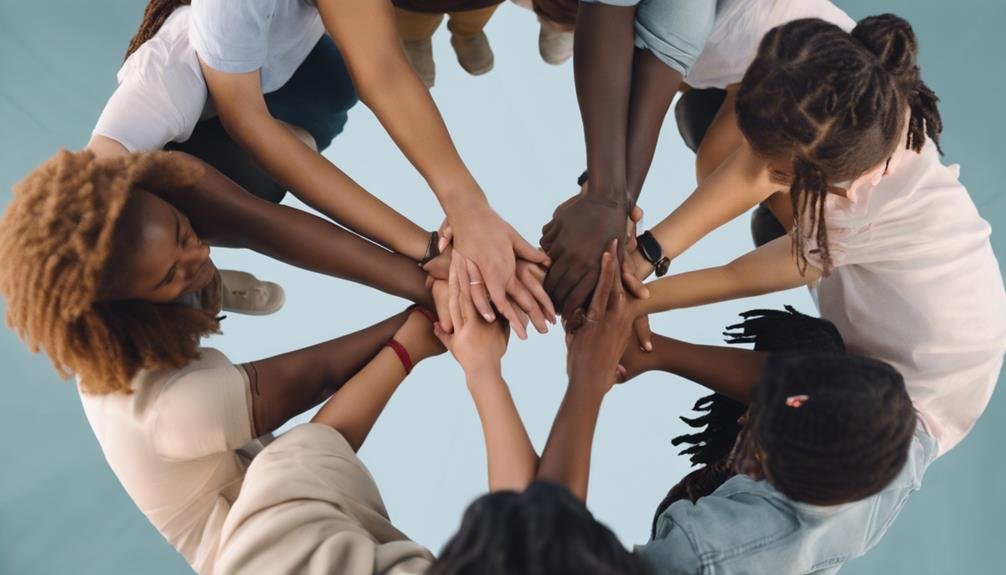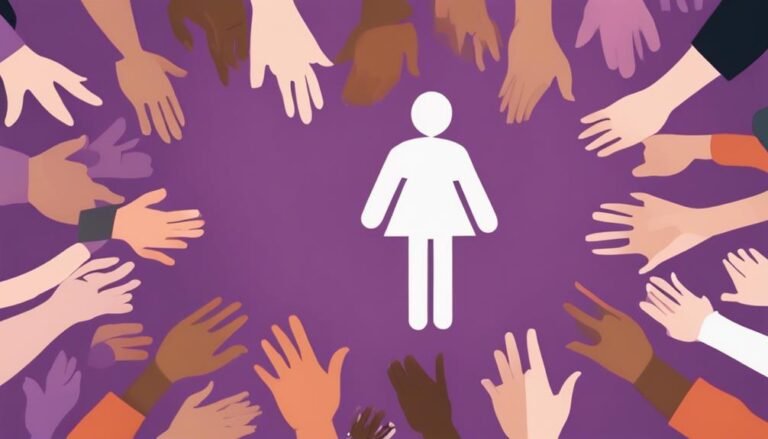When seeking community support for trauma survivors, start by reaching out to local organizations and agencies. They offer tailored services like counseling and support groups to aid in healing. Community centers and schools also provide valuable resources and safe spaces for survivors to connect. Building supportive networks and relationships is essential in the recovery journey, empowering survivors and offering practical assistance. Additionally, don’t hesitate to explore therapeutic interventions and counseling options for specialized support. Online and offline support groups provide platforms for sharing coping strategies and fostering understanding. Remember, a network of support is vital to healing and finding strength.
Key Takeaways
- Reach out to local organizations and agencies for tailored support services.
- Utilize community centers and schools for counseling and resources.
- Build supportive networks and relationships for understanding and empowerment.
- Seek therapeutic interventions and counseling for specialized care.
- Join online and offline support groups for empathy and practical assistance.
Local Organizations and Agencies
Local organizations and agencies actively engage in providing critical support for trauma survivors within their communities. These dedicated groups offer tailored services and resources to address the unique needs of trauma survivors in specific geographic areas.
By collaborating with community partners, these organizations enhance support networks and improve access to resources for those in need. Services such as counseling, support groups, advocacy, and referrals to other support systems are often provided by these local organizations and agencies.
This all-encompassing approach guarantees that trauma survivors have a range of options available to support their healing and recovery journey. Through the compassionate efforts of these organizations, trauma survivors can find the necessary support to navigate the challenges they face.
It’s through these essential community connections that individuals can begin to heal and rebuild their lives after experiencing trauma.
Community Centers and Schools

Community centers and schools often serve as important pillars of support for trauma survivors, providing a variety of resources and services to assist in their healing journey. These locations offer trauma survivors access to support groups, counseling services, and educational resources essential for their recovery.
Community centers and schools host workshops, therapy sessions, and group activities tailored to help survivors cope with trauma and navigate their healing process. Schools, in particular, can provide specialized programs, mental health resources, and referrals to community organizations, offering a well-rounded support network for trauma survivors.
Additionally, community centers serve as hubs for connecting survivors with peer support groups, mental health professionals, and various community resources crucial for their well-being. By creating safe spaces and fostering healing through a range of support services, both community centers and schools play an important role in supporting trauma survivors on their path to recovery and empowerment.
Supportive Networks and Relationships
Establishing supportive networks and nurturing relationships are key components in the journey of trauma recovery, providing invaluable understanding and empowerment to survivors. Trauma survivors often experience feelings of isolation and struggle to navigate the path to healing and recovery alone. By connecting with supportive networks and building strong relationships within communities, survivors can find the emotional support and resources they need to move forward.
Trusted relationships within these support networks offer practical assistance, share information on available resources, and provide a safe space for survivors to express themselves. These networks enable survivors to share experiences, gain insights, and access the necessary tools for their healing journey.
Additionally, fostering relationships within these supportive communities can empower survivors to become agents of change, not only in their own lives but also within their broader community.
In times of distress, having a supportive network and nurturing relationships can make a significant difference in the lives of trauma survivors. Let’s continue to emphasize the importance of community support and the role it plays in the healing process.
Therapeutic Interventions and Counseling

Utilizing therapeutic interventions and professional counseling is essential in providing specialized support and evidence-based interventions for trauma survivors. Cognitive Behavioral Therapy (CBT) has demonstrated effectiveness in alleviating PTSD symptoms even weeks after the traumatic event.
Early interventions in the posttraumatic period are important to prevent long-term effects of trauma and facilitate a smoother recovery journey.
In addition to CBT, crisis interventions and debriefing techniques are recommended to offer immediate support to individuals in distress. Tailored care plays a significant role in addressing the diverse needs and preferences of trauma survivors throughout their recovery process.
Online and Offline Support Groups
Connecting with others who understand and can relate to your experiences is an essential way to find support as a trauma survivor. Online support groups provide a safe space for survivors to share their stories, coping strategies, and challenges related to traumatic experiences. Platforms like Mental Health America’s Inspire community offer valuable resources and connections for individuals seeking emotional well-being and healing.
Additionally, offline support groups offer in-person interactions and opportunities to engage in healing activities alongside fellow survivors. By participating in these groups, community members can find empathy, understanding, and practical assistance on their healing journey from emotional abuse. Resources such as local Mental Health America affiliates or the National Mental Health Consumers Self-Help Group Clearinghouse directory can help survivors locate both online and offline support groups tailored to their specific needs.
Frequently Asked Questions
What Are the First Priorities for Helping Someone After a Traumatic Event?
When helping someone after a traumatic event, our first priorities are ensuring immediate care, emotional support, and safety measures.
Providing access to professional help is vital for the healing process.
Peer counseling, trust building, and promoting self-care are essential for coping strategies and resilience building.
Together, we can create a supportive environment that fosters recovery and empowers survivors to navigate their journey towards healing.
What Is a Good First Step in an Action Plan to Develop a Trauma Informed Community?
When starting on the journey to build a trauma-informed community, a pivotal first step is conducting a thorough needs assessment. This process helps us understand the gaps in trauma support services and identify areas needing improvement.
By prioritizing trauma education, community outreach, and resource mapping, we can begin laying a strong foundation for our action plan.
It’s imperative to engage stakeholders, provide training opportunities, and foster peer support to create a network of compassion and empowerment.
How to Help With Community Trauma?
To help with community trauma, we focus on trauma healing through community outreach, building a strong support network, promoting mental health, offering peer counseling, fostering empathy, creating healing spaces, sharing survivor stories, building resilience, and providing group therapy.
How Do I Find a Local Support Group?
When seeking a local support group, consider exploring various resources such as online platforms, therapist referrals, hospital programs, social media, community centers, hotline numbers, local organizations, school resources, peer support, and workshops/seminars.
These diverse options can provide connections and comfort during challenging times. Remember, reaching out is a sign of strength, and there are many avenues available to help you find the support you deserve in your community.
Conclusion
In times of trauma, finding community support is essential. Reach out to local organizations, community centers, and online support groups.
Build strong relationships and seek therapeutic interventions. Remember, healing isn’t a solo journey, but a collective effort.
Together, we can weather the storm and emerge stronger on the other side, like a tree rooted deep in the earth, bending but never breaking in the face of adversity. You aren’t alone.






